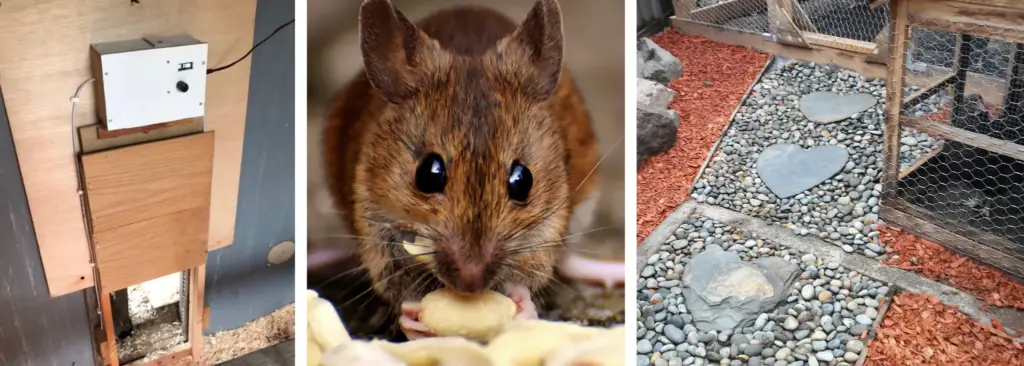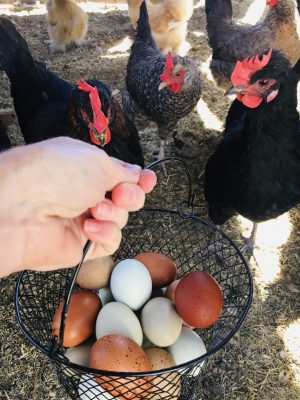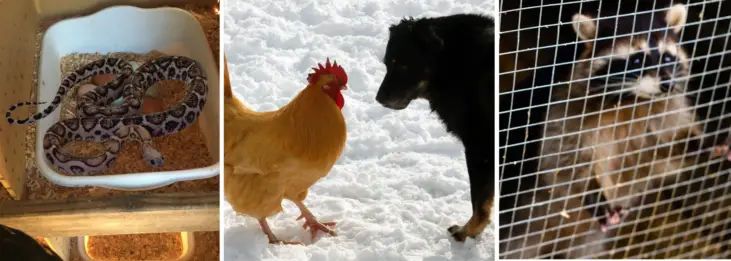
Depending upon where you live, you will have different types of chicken coop predators to watch out for. This article will cover the top 11 common backyard chicken predators and let you know how to make a predator safe chicken coop to prevent your chickens from becoming a tasty treat for any of them in the first place!
More and more people are looking into or are currently raising a flock of backyard chickens. With ownership, comes the responsibility of making sure they are safe from local chicken coop predators. It is important to know what types of predators are common in your area and make modifications to protect your chickens from being attacked in the first place.
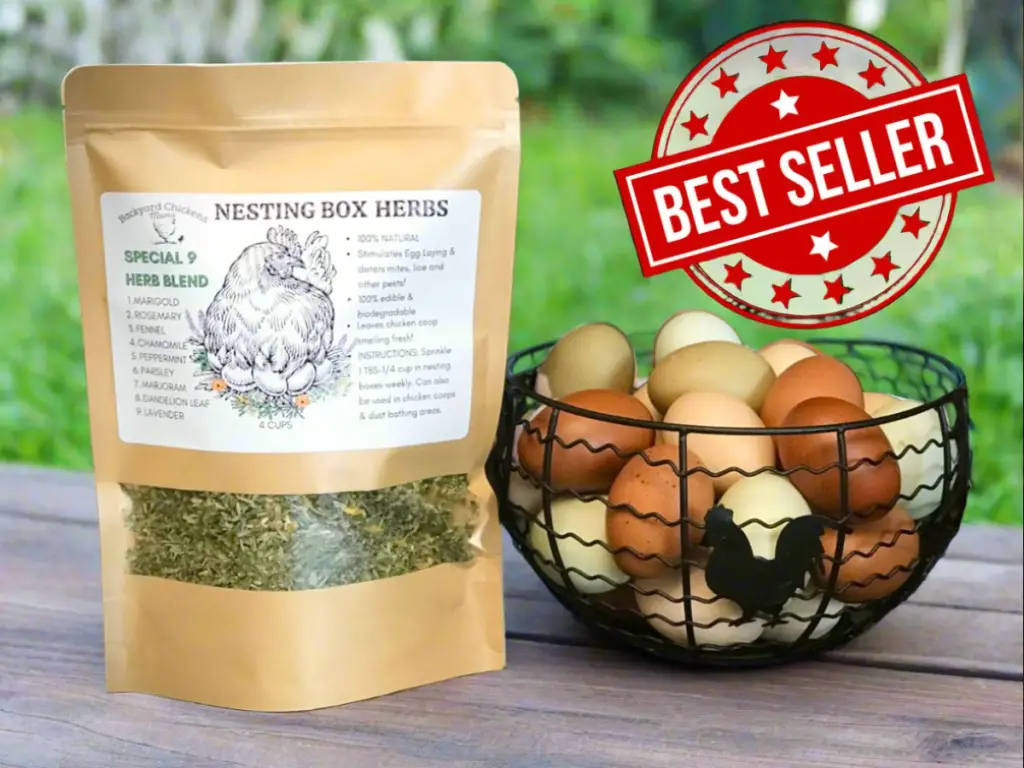
Increases egg laying naturally.
- Improves chicken health.
- Deters parasites: mites, lice, fleas & flies as well as mice, rats, raccoons, coyotes, opossums and more!
- On SALE!
- Shop: Nesting Box Herbs
Common Backyard Chicken Predators
| PREDATOR | % BACKYARD CHICKEN OWNERS REPORTED ATTACKS (2,660 VOTES) |
|---|---|
| RACCOON | 25.3% |
| HAWKS, OWLS, EAGLES | 19.4% |
| DOG | 15% |
| FOX | 11.7% |
| COYOTE | 5.1% |
| WEASEL | 4.7% |
| MAN | 3.7% |
| MINK | 2.5% |
| OPPOSUM | 2.3% |
| BOBCAT | 2% |
| CAT | 1.9% |
| RAT | 1.9% |
| BEAR | 1.7% |
| SNAKE | 1.2% |
| SKUNK | 0.9% |
| MOUNTAIN LION | 0.6% |
1. Dogs and Cats as Chicken Predators
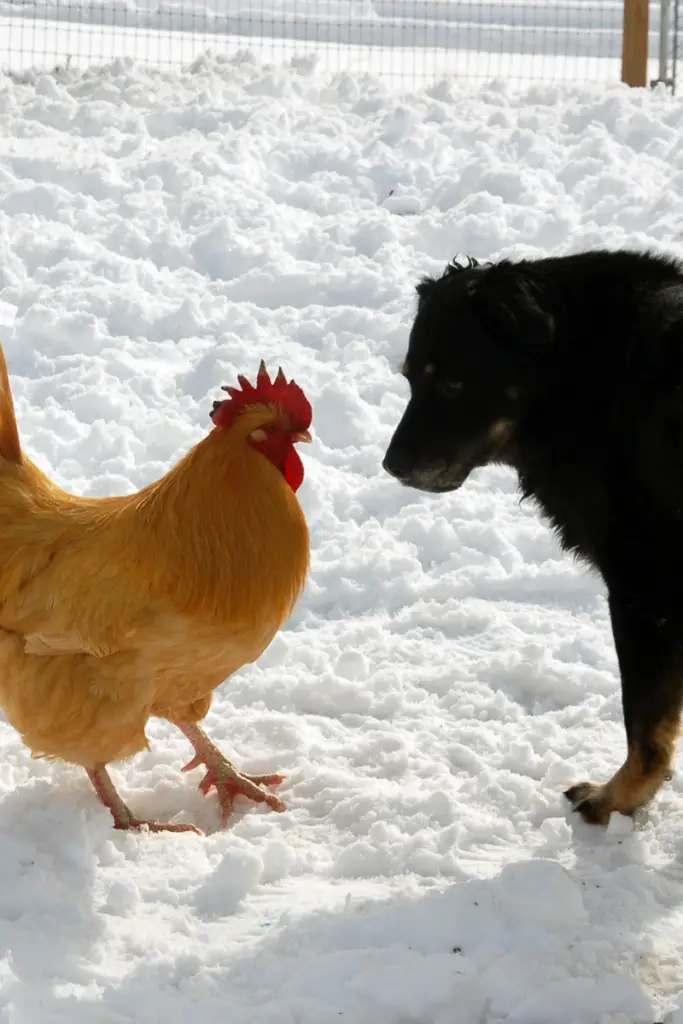
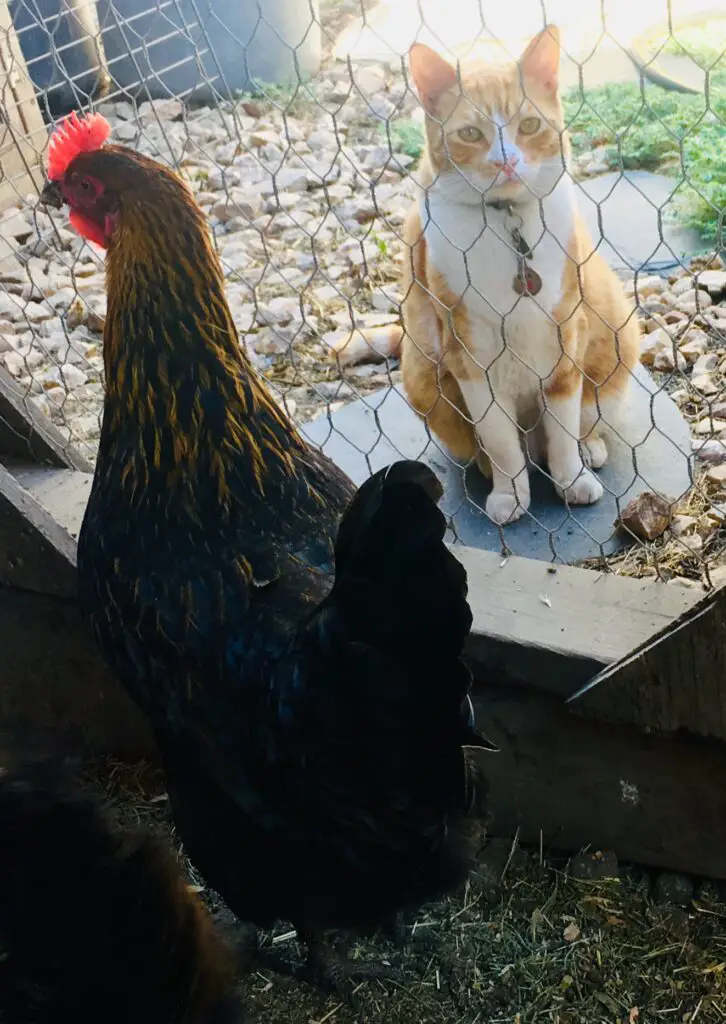
Neighborhood dogs and cats, including the homeowners own, are often pets that end up attacking a flock of chickens. Breeds that have a higher prey drive, such as terriers, huskies, German Shepherds and Greyhounds, have been bred to hunt and chase are generally not the best breeds to choose when looking for one that is safe with your chickens.
If you are looking for a livestock guardian dog, your best bet is with a Kuvasz or Old English Sheepdog. Other top picks that are bred for overseeing livestock are the Great Pyrenees and Anatolian Shepherd.
This does not mean that all terriers will attack your chickens or all Anatolian Shepherd’s will protect your flock. It is always best in the beginning to closely monitor your pets around your chickens before letting your chickens free range on your property.
Not all dogs that seriously hurt or kill chickens are meaning to actually do that. Some dogs want to just play with chickens and end up killing them.
As a chicken owner, one of our responsibilities is protecting chickens from harm. So, even if you think that your dog (cats too) doesn’t have a mean bone in its body, you really need to keep a close eye on them in the beginning. Within time, you can train them and have enough trust that they will not harm your chickens.
How Do I Protect My Chickens from Dogs?
| GET A ROOSTER |
| GUARD DOG |
| ELECTRIC FENCE |
| SECURE THEM IN CHICKEN RUN |
| LOCK IN COOP AT NIGHT |
What are the Best Dog Breeds to Protect My Chickens?
| BREED | BENEFITS |
|---|---|
| KUVASZ (SHEEPDOG) | LIVESTOCK GUARDIAN DOG |
| GREAT PYRENEES | BRED FOR OVERSEEING LIVESTOCK |
| ANATOLIAN SHEPHERD | LIVESTOCK GUARDIAN DOG |
| OLD ENGLISH SHEEPDOG | FARM HERDING DOG |
Dog Breeds With a High Prey Drive
| BREED | PROBLEM |
|---|---|
| TERRIER | BRED TO CHASE RATS |
| HUSKY | HIGH PREY DRIVE |
| GERMAN SHEPARD | HIGH PREY DRIVE |
| GREYHOUND | HIGH PREY DRIVE-BRED TO CHASE |
2. Raccoons as Chicken Predators
Raccoons are nocturnal and commonly attack chickens in the night. They are sneaky critters and are pretty talented at being able to open gates and undo latches of your chicken coop.
Raccoons can easily reach in with their hands and pull a chicken’s head and neck through the chicken wire and eat it. A sign that it could be a raccoon that attacked your chickens would be just finding your chickens head and crop missing.
“Chicken wire” will not keep raccoons from getting into your chicken run or coop. A determined raccoon can easily break through it and get to your chickens while they are sleeping.
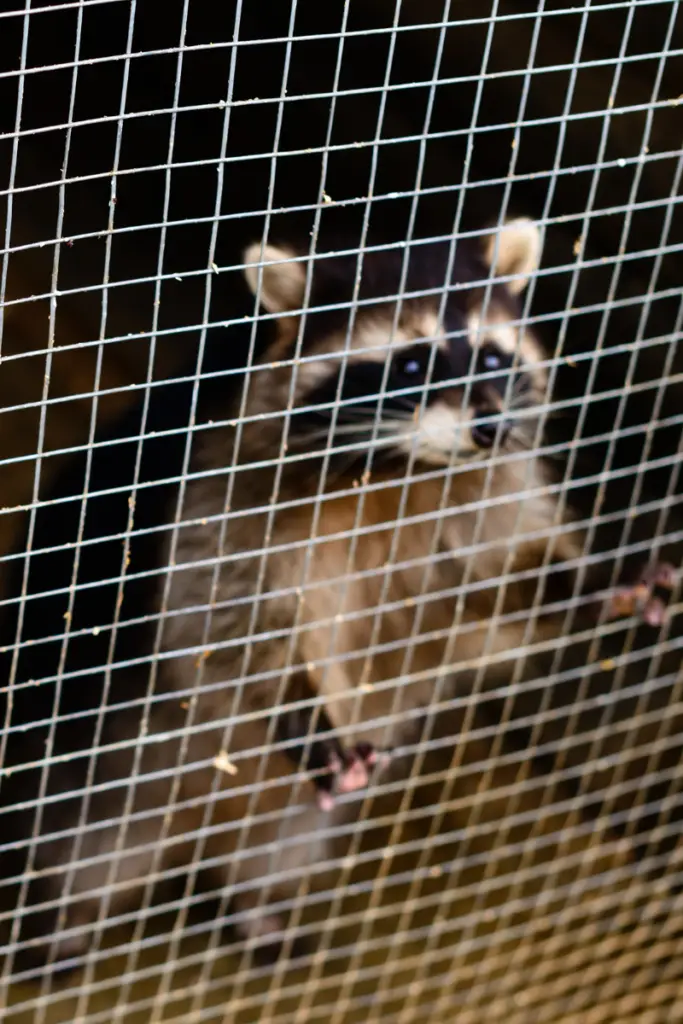
How Do I Protect My Chickens from Raccoons?
Use a 1/4″ or 1/2″ hardware cloth to keep raccoons from getting in. Hardware cloth is much harder material, usually stainless or galvanized steel.
Place hardware cloth around the entire perimeter of your chicken coop and run, burying it 12″ deep. This will deter it from trying to dig under to get into the coop.
Use 2 step locks, such as carabiner, spring or barrel style locks, to make it more difficult for raccoons to open gates and undo latches. Pretty much any lock that requires two hands to open a raccoon cannot open.
Using electric fencing around your chicken run and coop will also prevent raccoons from getting in.
Raccoons do not like the strong scent of lavender rosemary or mint. Help keep raccoons away by either planting fresh lavender, rosemary and peppermint around the perimeter of the coop. Or, you can sprinkle some dried herbs in and around the chicken coop.
Try my 9 Herb Nesting Box Blend, listed below. In addition to encouraging egg laying, it also helps to deter mites, lice, rats, mice, raccoons, opossums, snakes, bobcats, coyotes and fox!

Increases egg laying naturally.
- Improves chicken health.
- Deters parasites: mites, lice, fleas & flies as well as mice, rats, raccoons, coyotes, opossums and more!
- On SALE!
- Shop: Nesting Box Herbs
3. Birds of Prey as Chicken Predators
Birds of prey include not only hawks, but owls and eagles too. Hawk attacks are more common than any other bird of prey and they will do it during the daytime.
A hawk is capable of killing a chicken with its long talons. Hawks will feast on it while on the ground and carry parts of it away at a time, often bringing pieces of it to the nest to feed babies.
Owls will attack during the night. The Great Horned Owl has been known to sneak up on chickens at night and carry them off whole.
During the daytime, eagles are also very capable of quickly killing a chicken with its long, deadly talons and carrying them away to eat.
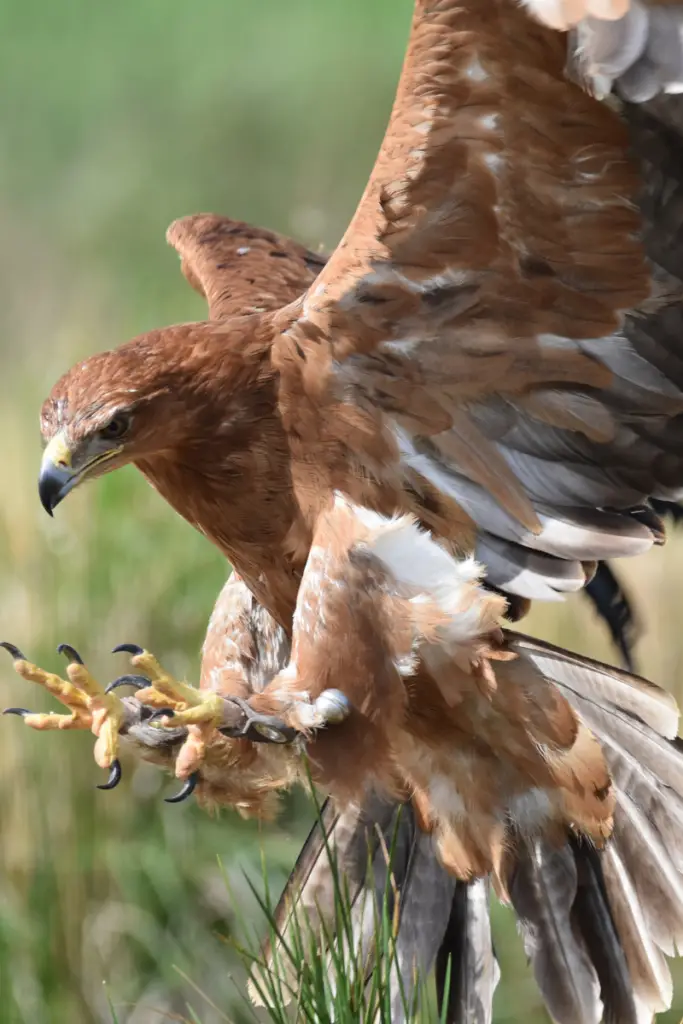
How Do I Protect My Chickens from Hawks?
You can protect your chickens from hawks as well as other birds of prey by making sure free ranging chickens have somewhere to take cover during the day time and ensuring their chicken coop and run is completely covered overhead. Consider installing hawk netting for chickens.
If you live in an area that allows roosters, it will alert your hens of an oncoming birds of prey and will gladly give his life to protect them. Also, always make sure your whole flock is locked up inside the coop at night.
4. Foxes as Chicken Predators
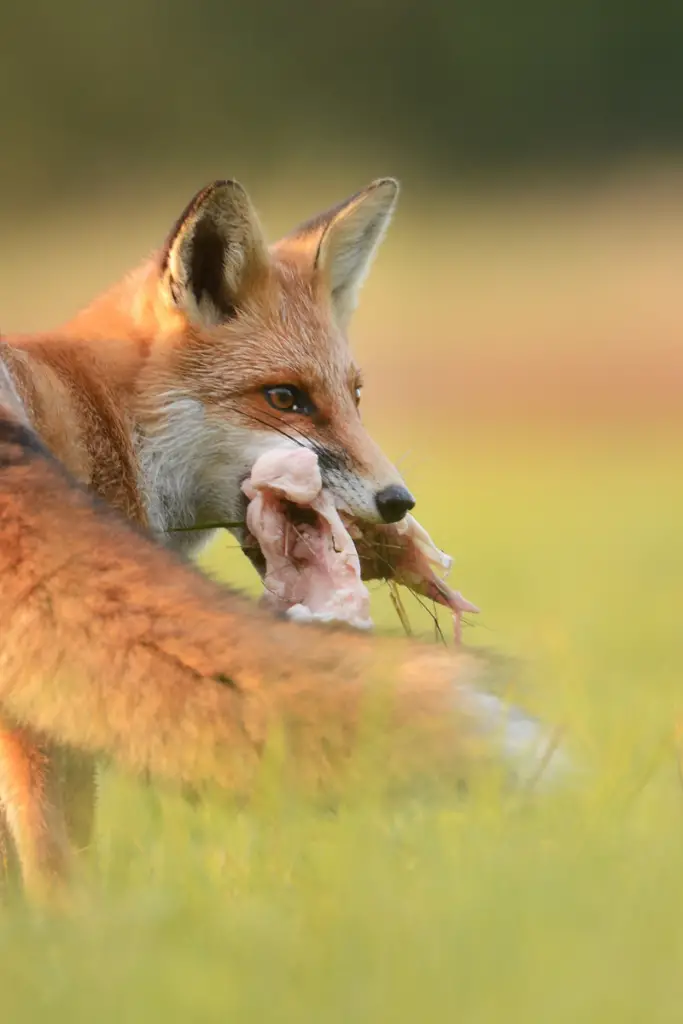
Fox are known to attack chickens most frequently early in the morning or early evening. It isn’t uncommon for a fox to sneak in and grab one or two chickens.
If you let your chickens free range, one or two may go missing. It usually will leave very little evidence of an attack because they often carry off the carcass to eat alone.
How Do I Protect My Chickens from Foxes?
| ROOSTER |
| GUARD DOG |
| ELECTRIC FENCE |
| HARDWARE WIRE ON COOP |
| HARDWARE WIRE AROUND PERIMETER OF COOP |
| PLANT OR SPRINKLE LAVENDER, ROSEMARY, MARIGOLD HERBS IN AND AROUND COOP |
Foxes do not like the strong scent of lavender, rosemary or marigolds. Help keep foxes away either by planting fresh lavender, rosemary and marigolds around the perimeter of the coop. Or, you can sprinkle some dried herbs in and around the chicken coop.
Try my 9 Herb Nesting Box Blend, listed below. In addition to encouraging egg laying, it also helps to deter mites, lice, rats, mice, raccoons, opossums, snakes, bobcats, coyotes and fox!

Increases egg laying naturally.
- Improves chicken health.
- Deters parasites: mites, lice, fleas & flies as well as mice, rats, raccoons, coyotes, opossums and more!
- On SALE!
- Shop: Nesting Box Herbs
5. Coyotes as Chicken Predators
Coyotes are very similar to foxes in that they will sneak in and snatch a chicken when you least expect it. They will leave very little evidence, maybe a few feathers and a little bit of blood.
They will usually attack a chicken and take it off to eat it in peace or carry it off to its pups.
Coyotes will hunt early morning and at sunset, preferring to not be around humans. But if it has a litter of pups to feed it will hunt anytime of day.
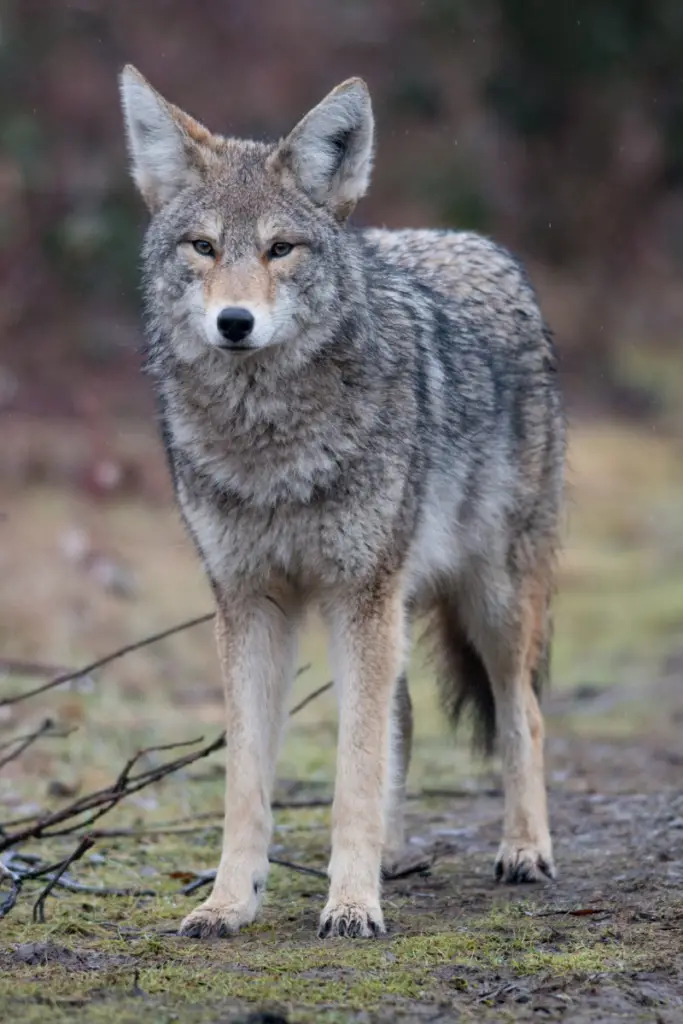
How Do I Protect My Chickens from Coyotes?
If you live in an area that you need to protect your chickens from coyotes, begin with having a rooster and guard dog to protect your flock.
An electric fence will also deter any foxes from getting to your chickens.
An alternative to an electric fence is making sure that your chicken coop and run is made with hardware cloth and not chicken wire. Chicken wire will not prevent a fox from getting inside, but hardware cloth can. It is much harder material, usually galvanized or stainless steel.
Coyotes do not like the strong scent of lavender or rosemary. Help keep coyotes away either by planting fresh lavender and rosemary around the perimeter of the coop. Or, you can sprinkle some dried herbs in and around the chicken coop.
Try my 9 Herb Nesting Box Blend, listed below. In addition to encouraging egg laying, it also helps to deter mites, lice, rats, mice, raccoons, opossums, snakes, bobcats, coyotes and fox!

Increases egg laying naturally.
- Improves chicken health.
- Deters parasites: mites, lice, fleas & flies as well as mice, rats, raccoons, coyotes, opossums and more!
- On SALE!
- Shop: Nesting Box Herbs
6. Snakes as Chicken Predators
Snakes are known to sneak in and eat your chickens eggs and baby chicks! In the United States there are several common snakes that will do this; milk snakes, black snakes, rat snakes(also sometimes called chicken snake), corn snakes, bull snakes and king snakes.
Bull snakes are the only venomous snake out of the bunch mentioned, but they all can punch a pretty nifty bite. They are capable of climbing up 1/2 to 2/3 their height. Your best bet is to snake proof your chicken coop.
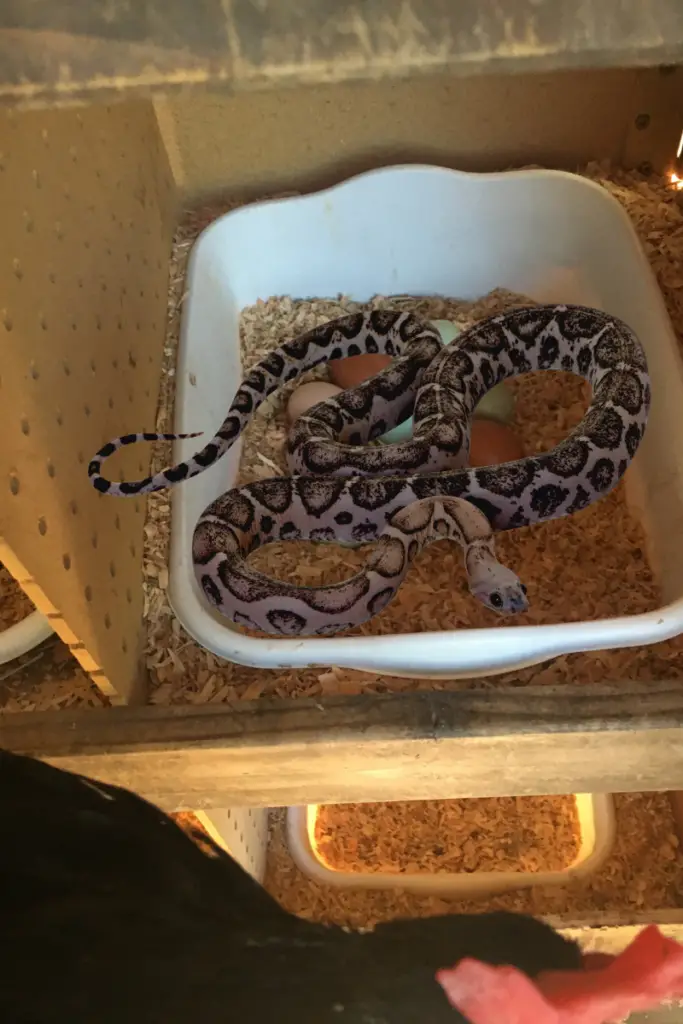
How Do I Protect My Chickens from Snakes?
You need to prevent snakes from getting INTO the coop. Chicken wire only protects your chickens from getting out, not predators from getting inside.
Use 1/4″ hardware cloth. It is small enough that a snake cannot squeeze through.
Don’t give snakes a reason to want into the coop in the first place. Gather all of your eggs throughout the day, especially before night time.
Collect all uneaten food at the end of each day. This is good practice to deter all predators.
Inspect the around the perimeter of your coop and make sure there aren’t any small cracks that a snake can slither through.
Clear all brush and debris from around the chicken coop. Keep grass short around the coop. Snakes like to hide out during the daytime in covered areas. Don’t give them any reason to hang this close to your chickens.
Snakes do not like the strong scent of lavender, rosemary or marigolds. Help keep snakes away either by planting fresh lavender, rosemary and marigolds around the perimeter of the coop. Or, you can sprinkle some dried herbs in and around the chicken coop.
Try my 9 Herb Nesting Box Blend, listed below. In addition to encouraging egg laying, it also helps to deter mites, lice, rats, mice, raccoons, opossums, snakes, bobcats, coyotes and fox!
I like to also sprinkle these dried herbs inside my chicken nesting boxes to deter snakes from getting any chicken eggs.

Increases egg laying naturally.
- Improves chicken health.
- Deters parasites: mites, lice, fleas & flies as well as mice, rats, raccoons, coyotes, opossums and more!
- On SALE!
- Shop: Nesting Box Herbs
7. Bobcats as Chicken Predators
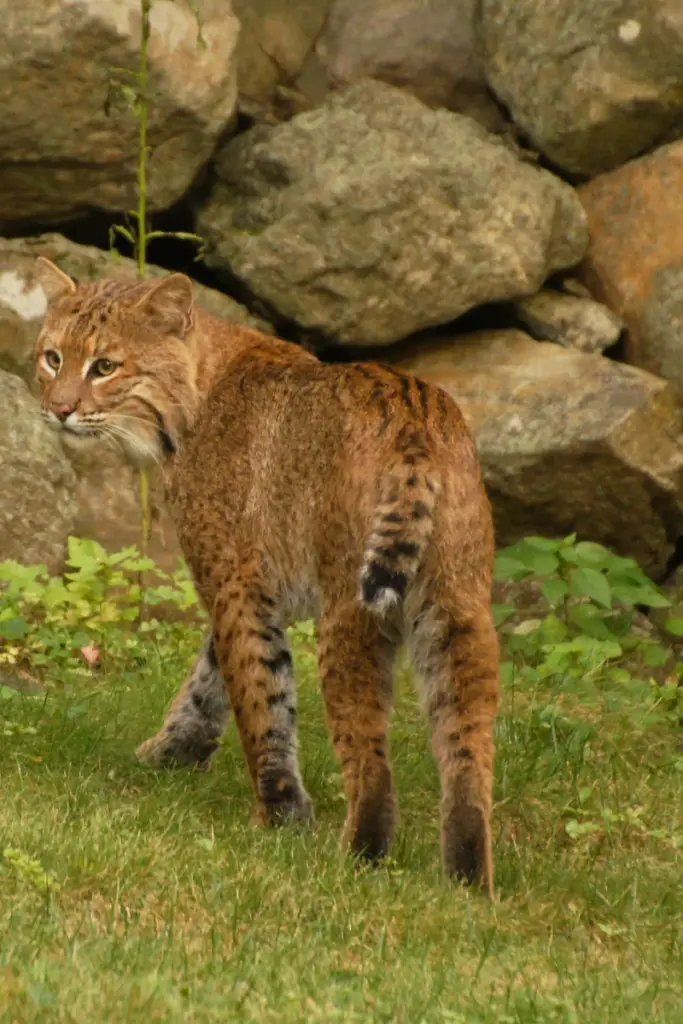
Bobcats are usually out between dusk and dawn, but are known to attack any time of day, especially if they are hungry.
A bobcat usually will stalk its prey and is extremely quick when it attacks. It has very sharp claws and if it leaves any part of the chicken behind, you will see claw marks on the back and shoulder area. It almost always consumes the head and crop.
Bobcats will cover any remains of a carcass with dirt, twigs, leaves and come will keep coming back until it has consumed all of it.
If you see any evidence of this behavior, it’s time to predator proof your chicken coop! Once a bobcat makes an appearance it is very likely to keep coming back.
How Do I Protect My Chickens from Bobcats?
To begin with, put away all uneaten food at the end of each day and do a final gathering of eggs just before dusk.
Bobcats can jump as high as 12 feet, so it is important to predator proof your chicken coop from up in roof area as well.
Bobcats will dig to gain entry from around the perimeter of the coop. Install 1/4″ hardware cloth 12″ deep around the entire perimeter of the coop.
Install electric fencing around the perimeter of your chicken coop.
Other alternatives are motion detector lighting, have a radio playing or motion detectors that trigger a loud noise. But, bobcats are pretty smart and once they notice that these devices do no harm, they will not help.
Bobcats do not like the strong scent of lavender, mint and lemon balm. Help keep bobcats away either by planting fresh lavender, peppermint and lemon balm around the perimeter of the coop. Or, you can sprinkle some dried herbs in and around the chicken coop.
Try my 9 Herb Nesting Box Blend, listed below. In addition to encouraging egg laying, it also helps to deter mites, lice, rats, mice, raccoons, opossums, snakes, bobcats, coyotes and fox!

Increases egg laying naturally.
- Improves chicken health.
- Deters parasites: mites, lice, fleas & flies as well as mice, rats, raccoons, coyotes, opossums and more!
- On SALE!
- Shop: Nesting Box Herbs
8. Skunks as Chicken Predators
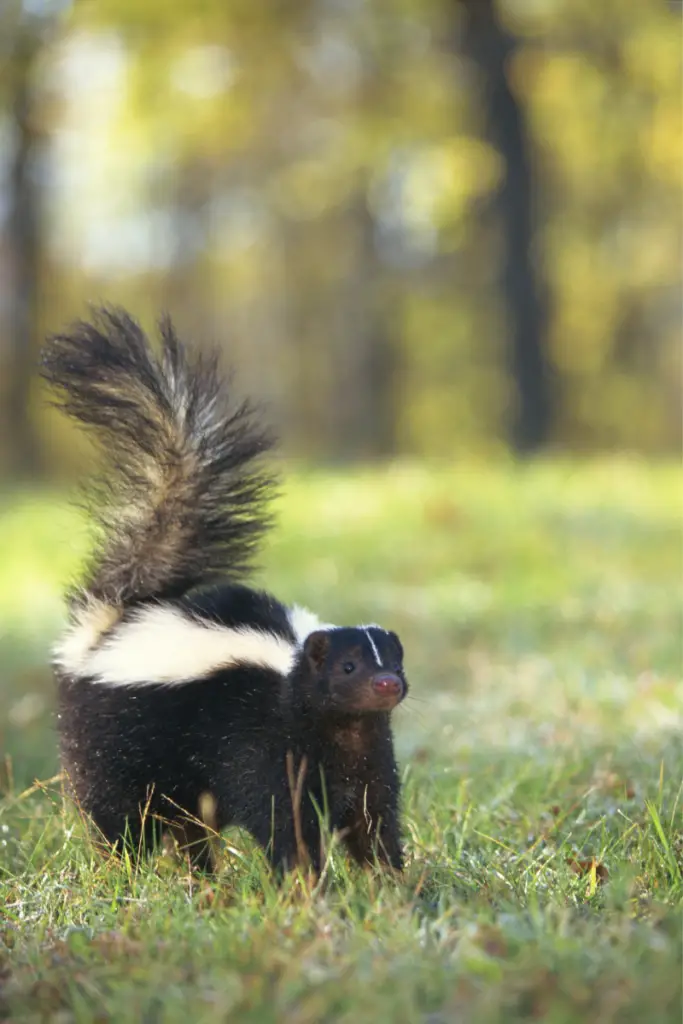
Skunks will usually only go after young chicks and chicken eggs. They will eat the abdomen, but leave the skin and muscles of a small chicken. They seldom will go after a fully grown chicken.
A tell tale sign of a skunk attack, other than it only consuming the abdomen, is the stinky “skunk” smell!
9. Opossums as Chicken Predators
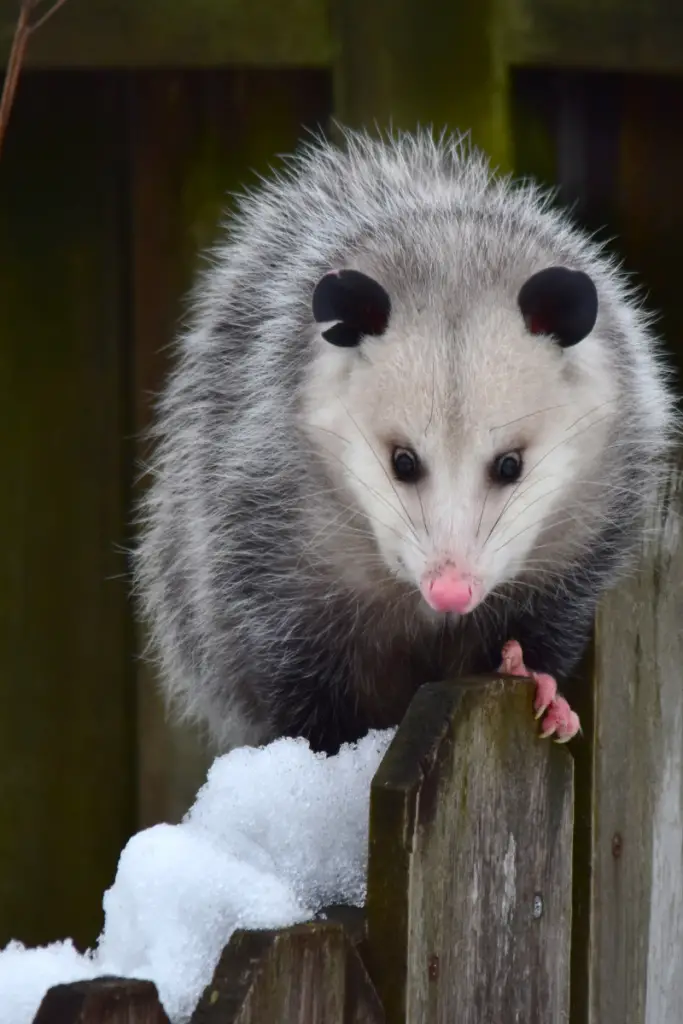
An opossum eats the abdomen of a chicken and chicken eggs, but will also consume the crop.
Opossums aren’t the worst things to have around because they will eat mice and rats. The idea is to keep them on the outside of your coop and not let them find ways of getting in.
Opossums do not like the smell of rosemary or peppermint. Plant some fresh peppermint and rosemary or scatter some dried peppermint and rosemary around the perimeter of your chicken coop to deter them. They can eat all of the mice and rats on the outside of your coop!
Try my 9 Herb Nesting Box Blend, listed below. In addition to encouraging egg laying, it also helps to deter mites, lice, rats, mice, raccoons, opossums, snakes, bobcats, coyotes and fox!

Increases egg laying naturally.
- Improves chicken health.
- Deters parasites: mites, lice, fleas & flies as well as mice, rats, raccoons, coyotes, opossums and more!
- On SALE!
- Shop: Nesting Box Herbs
How Do I Protect My Chickens from Skunks and Opossums?
| HOW TO PROTECT CHICKENS FROM SKUNKS AND OPOSSUMS |
|---|
| BRING IN ANY UNEATEN FOOD AT THE END OF EACH DAY |
| LOCK YOUR CHICKENS UP AT NIGHT |
| GUARD DOG |
| ROOSTER |
| USE HARDWARE CLOTH AROUND ENTIRE COOP |
| ELECTRIC FENCE |
| MOTION SENSOR LIGHTS |
| LEAVE RADIO ON AT NIGHT |
| SPRINKLE PEPPERMINT & ROSEMARY HERBS IN AND AROUND THE COOP |
10. Bear as Chicken Predators
Bears will destroy any coop to get to chicken feed, eggs, chickens and anything else in it. They are extremely strong and can climb over barbed wire fencing and level a chicken coop in no time flat.
How Do I Protect My Chickens from Bear?
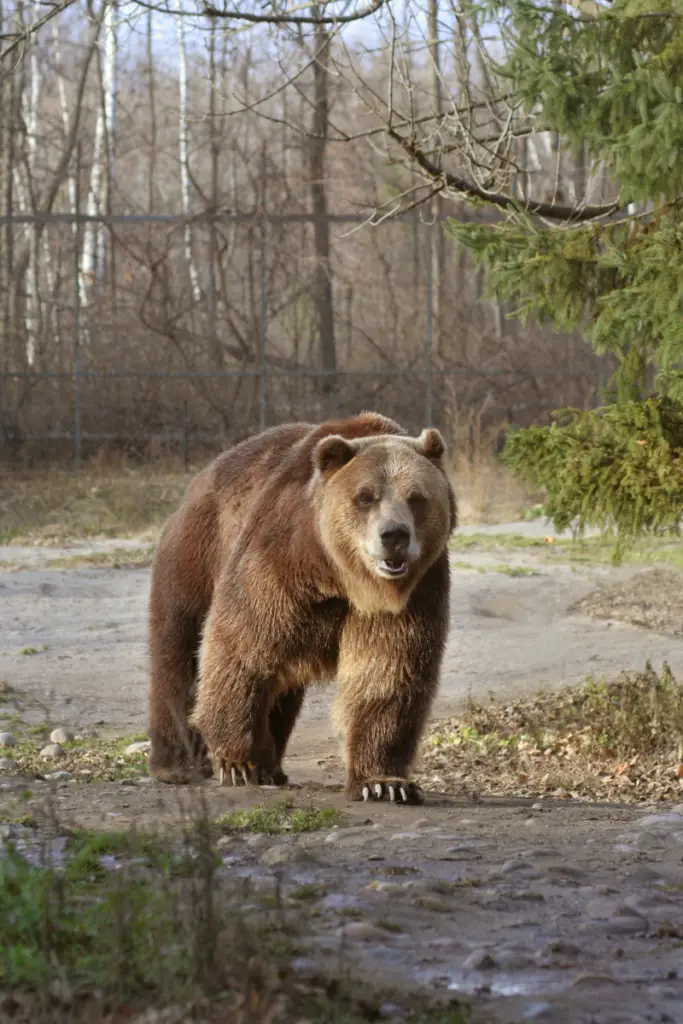
A bear can totally flatten a chicken coop. It will kill and eat the chickens, eggs, feed and anything else in the coop.
The best deterrent will have to be an electric fence. No matter how strong you think your chicken coop is, a bear can very likely knock it down.
Other deterrents that can help would be a guard dog, motion detector flood lights and motion detectors that make loud noises.
If you have a bear on your property, contact your states Department of Fish and Wildlife, DFW. They can help you to relocate it safely.
11. Rodents-Rats, Mice as Chicken Predators
Chicken coops can be a prime target for rodents, especially rats and mice. They not only can do harm to your chickens and the coop itself, but also can cause your hens to go on strike and stop laying. By following my 13 simple ways to rodent proof the chicken coop, you can put a stop to these pesky rodents from even wanting to hang around.
Backyard Chickens Mama
Use Fresh or Dried Herbs in and Around the Chicken Coop
Certain herbs, such as peppermint, rosemary, lavender and marigolds help to deter many different rodents, such as rats and mice.
Either plant these fresh herbs or sprinkle dried herbs around the perimeter of your coop to deter these rodents. I like to also sprinkle some inside the nesting boxes to deter snakes.
Try my 9 Herb Nesting Box Blend, listed below. In addition to encouraging egg laying, it also helps to deter mites, lice, rats, mice, raccoons, opossums, snakes, bobcats, coyotes and fox!

Increases egg laying naturally.
- Improves chicken health.
- Deters parasites: mites, lice, fleas & flies as well as mice, rats, raccoons, coyotes, opossums and more!
- On SALE!
- Shop: Nesting Box Herbs
How to Rodent Proof Your Chicken Coop
For a list of tips on how to protect your flock from rodents, read my article 13 Simple Ways to Rodent Proof the Chicken Coop

